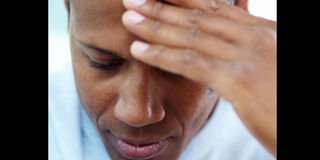ASK DOC: Why do I keep feeling dizzy?

For some months now, I start feeling dizzy out of the blue, and when I take soda or juice, I get back to normal. PHOTO| FILE| NATION MEDIA GROUP
Dr Flo, I am 27 years old. For some months now, I start feeling dizzy out of the blue, and when I take soda or juice, I get back to normal. I consulted several doctors, who recommended blood pressure, HB and RBS tests, but they are always normal. Why do I keep feeling dizzy?
Nas
Dear Nas,
Dizziness means feeling faint, unsteady, weak, or feeling as though the room is spinning. In most cases, it is mild and resolves on its own. If it is severe, or keeps recurring, or if it is associated with other symptoms, then it needs to be properly analysed by a doctor.
The most common causes of dizziness include dehydration, low blood sugar or hunger, stress or anxiety, migraines or severe headaches, ear problems, postural hypotension (blood pressure drops when you stand or sit up suddenly) or some brain disorders. It can also be due to pregnancy, excessive alcohol intake, drug abuse, some medications (e.g. blood pressure medicine, anti-depressants, some anti-histamines), heart disease, high or low blood pressure, low haemoglobin levels, diabetes, and any other illness affecting any other part of the body, including the common cold.
Since the list of possible causes is very long, usually the doctor will start with tests that are easier to do, and targeting the most common causes of dizziness. The tests get more complicated as you go down the list. If a specific cause for the dizziness is identified, then it is treated. There is medication that helps with severe dizziness temporarily.
In your case, since the dizziness goes away as soon as you take soda or juice, it is very likely that it is caused either by dehydration or by the lowering of your blood sugar when you get hungry. Therefore, you should make sure you eat adequate meals regularly and make sure to stay well hydrated at all times, especially if you are in a hot or windy place, or during strenuous exercise.
Dr Flo, I am 28 years old and I am getting married soon. My friends recently organised a bridal shower for me to prepare me for marriage. During the session, I was taught a few things about sexual intimacy by a sex aunt who was in attendance, but I have some concerns. One of the things she taught was about burning frankincense (udi) and standing over the smoke for a few minutes so that it goes into the vagina and the rest of the body. She said that it spices up intimacy but I am worried about whether allowing that smoke in there is safe. Swahili women have been doing this for ages and I have never heard of any adverse effects of this practice. Is it safe or will it predispose me to ill health in future?
Anne
Dear Anne,
Frankincense has been used for many years, mostly in religious and cultural rituals. It is also used in traditional medicine and by herbalists to help with boosting immunity, digestion, skin care, pain relief, and also for its anti-depressant and anti-anxiety effects. In reproductive health, it is said to help with balancing hormones and moistening of membranes.
Unfortunately, none of this has been studied scientifically, both for benefits and risks involved, and neither are there specific doses to achieve specific results. One scientific study does show that frankincense provides a benefit in the treatment of bladder cancer.
Whereas Swahili women (and others) have used this for years, there are also others who have never used it and have healthy sexual lives.
Dr Flo, I suffer from premature ejaculation and painful testes. During sex my erection lasts about two minutes. After the first ejaculation, I take long to get the second erection. Please help me solve my problem.
Charles
Dear Charles,
The normal sexual response cycle has four stages – arousal/excitement, plateau, orgasm and resolution. The intensity and time taken in each part of the cycle will differ from person to person, and even with every sexual encounter.
During arousal, there is increased heart rate and breathing, increased muscle tension, increased blood flow to the genitals and development of an erection for the man. This can take from a few minutes to even hours.
In the plateau phase, these symptoms increase to the brink of an orgasm. The orgasm is the climax, and this is when ejaculation occurs. After the climax, the next phase is resolution, when the breathing and heart rate go back to normal, the muscles relax, and you lose the erection.
Men usually experience a refractory period – during this time, the body recovers, and you are unable to get to a climax again, until the period passes. This means, that if you continue with sexual activity, it will take longer to achieve a climax a second time than the first time. This period is different for different people and it usually becomes longer as you grow older. Women do not have a refractory period, and can experience multiple orgasms, one after the other.
With advice from a sex therapist or an urologist, you can learn how to delay ejaculation. This usually involves exercises that you can carry out alone or with your partner. If your testes have pain, then you will need to have an examination by a doctor and go through some tests to figure out the cause. It can be due to sexual tension, but sometimes it may be due to infection or other illnesses which need to be treated as soon as possible.


